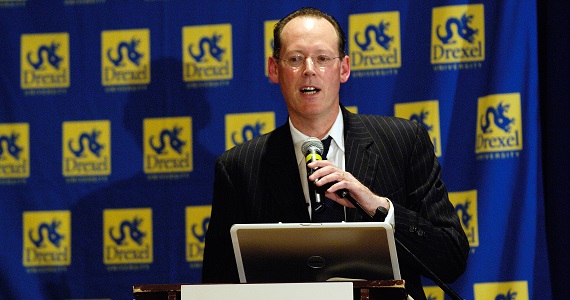The Legacy of Dr. Paul Farmer, a Visionary Health and Human Rights Activist
 Dr. Paul Farmer giving the first Jonathan Mann Health and Human Rights Memorial Lecture at Drexel in 2007.
Dr. Paul Farmer giving the first Jonathan Mann Health and Human Rights Memorial Lecture at Drexel in 2007.
February 23, 2022
By Joseph Amon, PhD, MSPH
Clinical Professor and Director of the Office of Global Health
In November 2007, Dr. Paul Farmer, Harvard Professor, co-founder of Partners in Health, and visionary health and human rights activist, gave the Jonathan Mann Health and Human Rights Memorial lecture at Drexel University. The talk was introduced by Lydia Mann, the daughter of Dr. Jonathan Mann, founding Dean of what is now the Dornsife School of Public Health.
In her introduction, Lydia said that her father believed that to become a public health professional “implicitly places you on the side of those who believe that the world can change. Every act challenges the apparent inevitability of the world as it is and the natural history of illness, disability and death. At a profound, even instinctual, level people become health professionals to struggle against the weight of human suffering and thereby place themselves among those who intervene in the present because they believe the future can be different.”
Looking back at Paul’s lecture, which was entitled "Rethinking Global Public Health: Prevention, Care, and the Role of the American University," I was struck by how much Lydia’s reflection on her father also describes Paul, who saw Mann as a mentor and friend. In the many tributes that have been written since Paul’s untimely death on February 21, 2022, a common theme is of how Farmer inspired generations of students to question the status quo: Why is it acceptable that some individuals have access to information, to prevention, and to the best care possible while others do not? Whether it was HIV, TB or COVID – in Haiti, Rwanda or in the U.S. – Paul, like Jonathan Mann before him, forced people to see not just the immediate determinants of health, but also the underlying structural and political determinants that public health professional often feel are beyond their scope of work.
For Paul, the notion that health is a human right was obvious. But it was also profound, and it had consequences for how public health should be taught, how global health should be delivered, and how public health practitioners should engage individuals, communities and policy makers. Paul’s writing over the past two years on COVID-19 and beyond illustrates the issues he was absorbed by, and highlights his blunt assessment of where we are failing.
On COVID-19, Paul foresaw the massive challenge it would be to vaccinate the world. Presently, only 12 percent of the population in low-income countries around the world have received at least one dose of a vaccine. In high- and upper-middle-income countries, this figure is 79 percent. Recognizing this, Paul advocated for a temporary intellectual property waiver of COVID-19 vaccines.
Paul and co-authors said: “The longer states stall, the more people die needlessly. COVID-19 has repeatedly shown that people without access to resources such as strong health systems, health workers, medicines, and vaccines will preferentially fall ill and die. For too long, this cycle has been “other people’s” problem. It is not. It is
our problem.
Paul also focused his attention on the patterns of racial disparities of COVID-19 in the U.S. To address the structural racism causing these disparities, Paul and his co-authors advocated for racial-justice interventions and reparations for Black Americans that could decrease COVID-19 and other public health risks. he also wrote about the need to address the risk of COVID-19 in jails and prisons in the U.S. through vaccination and decarceration: “On the grounds of scientific evidence and our ethical responsibility to protect the vulnerable and the public at large, we can use our influence to demand” these changes. He wrote too of the need to protect health workers, globally, from COVID infection.
Beyond the issue of COVID-19, Paul championed other health issues that he saw as not getting enough attention among public health donors and practitioners, including expanding the capacity of the global health workforce and looking at the long-term impact of Ebola in West Africa, and the myriad health consequences of poverty in Haiti. He wrote of the millions of people globally who suffer, needlessly, from lack of access to palliative care. He also recognized what he referred to as “the moral case for global mental health delivery”, and the structural violence that is often committed on people with mental illness, occurring at the intersection of deprivation, exclusion, and discrimination.
Focusing too much on specific health issues misses the important holistic view that Paul brought to public health. Paul was skeptical of what he described as “narrowly defined technological fixes”, and the ways in which these “fixes” could individually be seen as effective and affordable but could be competed against one another or delivered in silos, ultimately failing to deliver the comprehensive public health systems that communities need.
The Dornsife School of Public Health is rare among U.S. public health schools in proclaiming what Paul saw as obvious: health is a human right. In memorializing his life, and remembering and celebrating his many accomplishments, it is essential to remember the important lessons Paul highlighted during his 2007 talk and to which he continued to promote through his writing, his teaching and mentorship, and his impact on public health throughout the world. Paul’s death is an enormous loss but his teaching continues and the dedication of Dornsife students will ensure his legacy will endure.
Watch Dr. Farmer's Mann Lecture